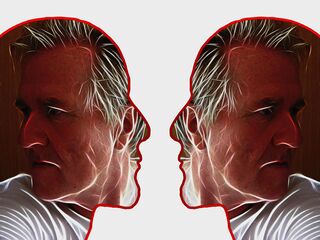Memory
Double Jeopardy
The chemical damage to cognition and memory leaves addicts in double jeopardy.
Posted January 21, 2021

Nina looked at me in confusion. For four months, she had been eating very little and drinking almost nonstop, and she clearly did not understand her diagnosis of liver damage.
“My brain isn’t working well,” she said, clearly puzzled and worried. “I can’t sort out my thoughts, because I can’t remember them.”
Nina was only 41 years old, but she was already experiencing alcohol-related damage to the structures in her brain that governed her cognitive abilities. She could no longer think clearly or create accurate memories, and she was having trouble grasping the severity of her drinking problem. As a high-level manager with a technology company, she was also in danger of losing her job.
After giving Nina a screening test for alcoholism—her score indicated that she was in an advanced stage of addiction—I strongly urged her to enter a treatment program. When she refused, I asked her to attend AA.
“I have heard all their stories, and I’m not going back there,” she said. “I know what I need to do, and I’m going to do it.” It was far from an optimum approach, but it worked, at least in the short run, and when I last saw her, she was still sober.
The mental decline that Nina experienced is one of the hallmark symptoms of addiction. It is caused in part by damage to the brain’s frontal cortex, the center for a host of cognitive functions, including:
- Impulse control
- Planning and organizing
- Problem-solving
- The ability to understand cause and effect, learn from mistakes, and connect the dots between a behavior and its consequences
As a result of this neurological impairment, addicts find it increasingly difficult to connect the dots between a behavior and its consequences and to learn from their mistakes.
Closing Time
One night, with plenty of money in my pocket, I stole a 12-pack of beer from a grocery store. It was after the 2 a.m. cut-off to buy alcohol, and I figured the clerk wouldn’t let me buy anything.
This wasn’t a decision that any right person would make. But I was attending a party that had run out of beer, and I wasn’t going to let anyone tell me what to do. If any part of my brain was saying, ‘Don’t do this,’ I didn’t hear it.
I hadn’t noticed the policeman working late-night security, and when I tried to walk out of the store with the beer, he arrested me on the spot. Even as he was lecturing me and writing out a ticket, I couldn’t grasp what had gone wrong.
—James B.
The mental challenges created by addiction include chemical damage to the hippocampus, the brain’s memory center. This injury makes it difficult for addicts to register their experiences and learn from them. In blackout drinking, for example, individuals appear to function normally, but they are not creating or storing memories.
“He acts as if nothing ever happened,” said the confused wife of an alcoholic after a nightmarish evening of fighting. “Am I making the whole thing up?” For her husband, the answer was yes. Without the memory of his out-of-control behavior, he was cut off from a reality check that might have motivated him to seek help.
Many alcoholics experience euphoric recall, a memory distortion that casts even harmful behaviors in a rosy, bucolic light. Likewise, the luminous intensity of early drug experiences can create memories so enchanting that users spend the rest of their lives ‘chasing the dragon’s tail.’
“I wasn’t looking for the next high but one I had years earlier,” reports James B. “I thought that if I kept tinkering with my recipe, eventually I would find just the right combination of alcohol and cocaine to get back to that magic place.
“It never worked, and I never gave up hope that it would.”
The chemical damage to cognition and memory leaves addicts in double jeopardy. Internal and external cues easily trigger the ‘go’ switch in the brain’s reward system, and craving goes quickly to full throttle. These cues range from emotions and thoughts to encounters with drug-using friends, ads for alcohol, the sight and smell of drugs, and the physical and mental symptoms of withdrawal. Some signals even register outside of conscious awareness, making defending oneself virtually impossible.[i] At the same time, the stop functions of the brain, including memory and inhibition, are all but inoperable. The addicted brain is like an out-of-control driver putting the pedal to the floor—in a car without brakes.
Obsessed by drugs and handicapped by cognitive decline and memory distortions, addicted individuals have little or no ability to regulate their behavior. Their extreme powerlessness is increased by denial, one of the remaining great mysteries of addiction.
References
[i] A. R. Childress et al., “Prelude to Passion: Limbic Activation by ‘Unseen’ Drug and Sexual Cues,” PLoS ONE 3, no. 1 (2008): e1506, doi:10.1371/journal.pone.0001506.




